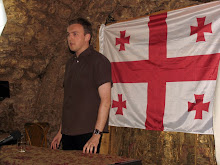Despite winning 57 per cent of the vote, South Ossetia’s Supreme Court annulled the results on the grounds of voter intimidation. The winning candidate, Alla Dzhioyeva who was not supported by Moscow, was barred from running in the repeat election scheduled for March 2012.
The second and last term of Eduard Kokoity, the de facto president of the breakaway Georgian region of South Ossetia since 2001, has come to an end. In November, presidential elections were held in this “republic”, whose independence had been recognised by the Russian Federation. Eduard Kokoity wanted to stay in office himself for the third term although officially he denied such a sentiment. In June of this year, the matter was finally settled by the South Ossetian Supreme Court. The court ruled that a referendum of Ossetians on another term for Kokoity was unconstitutional. This verdict aside, his remaining in power was also opposed by the Kremlin, which was directly expressed Sergey Naryshkin, chief of the Russian Presidential Administration. Kokoity tried to promote the candidacy of one of his closest associates but he did not succeed.
Elections: round one
The first round of voting took place on November 13th with as many as eleven candidates running. The most serious contestant was Anatoly Bibilov, minister for emergencies, who received the support of Moscow. The first rumours that the Kremlin would support him appeared in August in the Russian Kommersant daily. Bibilov, just forty years old, was born in Tskhinvali and graduated from the Soviet Ryazan Airborne Military Command School. In 1994-1996 he was commander of a special task force in South Ossetia. Later he worked for a Kyiv-based company and served in the so-called “peace corps” in South Ossetia. Before the Georgian-Russian war in August 2008 he served as a deputy commander of the North Ossetian peace battalion in the conflict zone. In November of 2008 he was made emergencies minister and has stayed in this function until today.
Czytaj dalej: http://www.neweasterneurope.eu/node/117
sobota, 3 grudnia 2011
Subskrybuj:
Komentarze do posta (Atom)




Brak komentarzy:
Prześlij komentarz